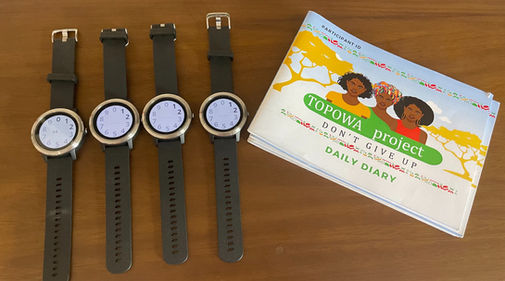
TOPOWA Project Overview
The TOPOWA project is a 5-year long research study, funded by the NIH, to address the social drivers of mental illness in low-income settings. Our study will determine the link between place and mental health among young women who live in the slums of Kampala, Uganda. The study will also determine if vocational training and women empowerment initiatives such as strengthening entrepreneurship skills will improve mental health trajectories for women in poverty.
The collaborative and transdisciplinary study has many different project pieces and brings together researchers from several institutions. The lead researchers represent Virginia Commonwealth University, Kennesaw State University, Georgia State University and Makerere University, but there are many other affiliate researchers from other institutions as well. The Community Based Organization that lead the study implementation and intervention is our long-term partner the Uganda Youth Development Link (UYDEL).
Read more below. And, meet the project team.
We have also added all project related publications in a list below.
Project Components

Focus Groups
We have conducted focus group discussions with young women to determine how they perceive their environment. We have asked about how the environment may contribute to mental health including depression and anxiety or to resilience and fortitude. The main goal of these focus groups was to pinpoint what aspects of the environment may be most impactful in their lives. We also wanted to know how vocational and skill training may have impacted their lives and what the facilitators and barriers were of attending such training. The information from the focus groups was used to inform the intervention delivery and also the prospective cohort study that is now underway.
PhotoVoice
We have also conducted a PhotoVoice project, a participatory qualitative study component that comprises both art and behavioral science. We engaged with the young women who live in the slums and empowered them to capture their environment through photograpy. Through their lens we gained insights on their views of how they feel and what in their environment impacts their mental health. This project component included group discussions and reflections of the photographs to increase our understanding how both the built environment and social drivers impact mental health among these young women.


Community Mapping
To understand the specific environmental influences and how they contribute to mental health, we also mapped communities where study participants live. We extended previous research and our previous work on the "slum rating scale" to quantify exposure to commercial determinants of health, as well as the typical indicator of urban slums such as lack of water, lack of sanitation, overcrowding, and non-durable housing structures.
Cohort Studies
The key component of the TOPOWA study assesses the outcomes of vocational training as an intervention to address the link between poverty and mental illness. We are currently conducting two parallel cohort studies, one which receive the vocational skills based intervention which we refer to as the Socioeconomic Skills Based Targeted Training (SeSTT), to assess sadness, anxiety, substance use and suicidality over two years. The second cohort is a community based comparison group. We also measure several biomarkers of stress and stress response including cortisol levels and sleep patterns. This study component will be completed in 2026 and include 10 interviews and data collection assessments (every three months) of the women in both cohorts.

TOPOWA Project Publications
Natuhamya, C., Nabukalu, E., Lyons, M., Gittner, K. B., Palmier, J., Culbreth, R., & Swahn, M. H. (2025). Effect of social perspectives in the relationship between suicidal ideation and depression among young women in slums of Kampala, Uganda. BMC psychiatry, 25(1), 568. https://doi.org/10.1186/s12888-025-06930-0
Click here - available open access
Lyons, M., Palitsky, R., Gittner, K. B., Nabulya, A., Hall, W., Palmier, J., & Swahn, M. H. (2025). Social Drivers of Infectious Disease Transmission and Treatment Among Young Women in Kampala, Uganda's Informal Settlements: A Qualitative Analysis of Focus Group Data From a Community-Based Cohort Study. Health promotion practice, 15248399251328332. Advance online publication. https://doi.org/10.1177/15248399251328332
Nielsen, K. E., Mobley, K., Culbreth, R., Palmier, J. B., Matovu, G., Nabulya, A., & Swahn, M. H. (2025). Wearable technology and daily diaries for studying mental health: lessons learned from pilot studies in Kampala, Uganda. Global mental health (Cambridge, England), 12, e17. https://doi.org/10.1017/gmh.2025.9
Click here - available open access
Swahn, M. H., Natuhamya, C., Culbreth, R., Palmier, J., Kasirye, R., & Dumbili, E. W. (2025). Alcohol marketing as a commercial determinant of health: daily diary insights from young women in Kampala. Health promotion international, 40(1), daaf002. https://doi.org/10.1093/heapro/daaf002
Click here-available open access
Swahn, M. H., Nabulya, A., Nassaka, J., & Palmier, J. (2025). Feasibility, Challenges and Lessons Learned: Photovoice Implementation Among Young Women in the Urban Slums in Kampala, Uganda. International Journal of Qualitative Methods, 24. https://www.mdpi.com/1660-4601/21/2/184
Click here - available open access
Nielsen, K., Mobley, K., Culbreth, R., Palmier, J., Nabulya, A., & Swahn, M. H. (2024). Feasibility and acceptability of wearable devices and daily diaries to assess sleep and other health indicators among young women in the slums of Kampala, Uganda. Digital health, 10, 20552076241288754. https://doi.org/10.1177/20552076241288754
Click here - available open access
Swahn, M. H., Palmier, J., Culbreth, R., Bbosa, G. S., Natuhamya, C., Matovu, G., & Kasirye, R. (2024). Alcohol Use among Young Women in Kampala City: Comparing Self-Reported Survey Data with Presence of Urinary Ethyl Glucuronide Metabolite. International journal of environmental research and public health, 21(9), 1256. https://doi.org/10.3390/ijerph21091256
Click here - available open access
Swahn, M. H., Gittner, K. B., Lyons, M. J., Nielsen, K., Mobley, K., Culbreth, R., Palmier, J., Johnson, N. E., Matte, M., & Nabulya, A. (2024). Advancing mHealth Research in Low-Resource Settings: Young Women's Insights and Implementation Challenges with Wearable Smartwatch Devices in Uganda. Sensors (Basel, Switzerland), 24(17), 5591. https://doi.org/10.3390/s24175591
Click here - available open access
Culbreth, R. E., Nielsen, K. E., Mobley, K., Palmier, J., Bukuluki, P., & Swahn, M. H. (2024). Life Satisfaction Factors, Stress, and Depressive Symptoms among Young Women Living in Urban Kampala: Findings from the TOPOWA Project Pilot Studies. International journal of environmental research and public health, 21(2), 184. https://doi.org/10.3390/ijerph21020184
Click here - available open access
Swahn, M. H., Nassaka, J., Nabulya, A., Palmier, J., & Vaught, S. (2022). A Qualitative Assessment of Place and Mental Health: Perspectives of Young Women Ages 18-24 Living in the Urban Slums of Kampala, Uganda. International journal of environmental research and public health, 19(19), 12935. https://doi.org/10.3390/ijerph191912935
Click here - available open access























